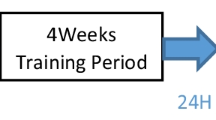Abstract
Objective
To investigate the inhibitory effect of tetramethylpyrazine (Tet) preconditioning on overload training-induced myocardial apoptosis in rats, and to explore cardioprotective mechanisms of Tet preconditioning.
Methods
A total of 25 male Sprague-Dawley rats were randomly divided into three groups, including the control group (n=5), the overload training group (overload training for 8 weeks, n=10), and the Tet preconditioning group (Tet preconditioning for 8 weeks before overload training, n=10). After 8 weeks, cardiac structure and myocardial apoptosis were analyzed by histology, transmission electron microscopy, and terminal deoxynucleotidyl transferase-mediated dUTP-biotin nick end labeling assay staining. The expressions of Bcl-2, Bax, Caspase-3, and Caspase-9 in myocardium were evaluated by immunohistochemical staining.
Results
Overload training caused swelling, disorder, partial rupture, and necrosis of myocardial focal necrotic fibers, as well as mitochondrial vacuolization, cristae rupturing, and blurring. In contrast, Tet preconditioning attenuated the swelling of myocardial fibers, decreased the amount of ruptured fibers, and inhibited mitochondrial vacuolization, resulting in clear cristae. Overload training significantly increased Bax expression and decreased Bcl-2/Bax ratio when compared with the control group (P<0.01). Conversely, Tet preconditioning significantly increased Bcl-2 expression and the Bcl-2/Bax ratio as compared with the overload training group (P<0.05). Overload training dramatically increased the expressions of Caspase-3 and Caspase-9 when compared with the control groupP<0.05). Following Tet preconditioning, the expression of Caspase-3 was significantly reduced compared with the overload training group (P<0.05), while Caspase-9 expression showed a slight decline (P>0.05).
Conclusion
Tet preconditioning increased the expression of Bcl-2 and reduced the expression of Caspase-3, thereby attenuating overload training-induced myocardial apoptosis, protecting against overload training-induced myocardial injury, and reducing damage to the myocardium due to overload training.
Similar content being viewed by others
References
Carraro U, Franceschi C. Apoptosis of skeletal and cardiac muscles and physical exercise. Aging (Milano) 1997;9:19–34.
Kadaja L, Eimre M, Paju K, Roosimaa M, Põdramägi T, Kaasik P, et al. Impaired oxidative phosphorylation in overtrained rat myocardium. Exp Clin Cardiol 2010;15:e116–e127.
Chiong M, Wang ZV, Pedrozo Z, Cao DJ, Troncoso R, Ibacache M, et al. Cardiomyocyte death: mechanisms and translational implications. Cell Death Dis 2011;2:e244.
Van Cruchten S, Van den Broeck W. Morphological and biochemical aspects of apoptosis, oncosis and necrosis. Anat Histol Embryol 2002;31:214–223.
Boyd CS, Cadenas E. Nitric oxide and cell signaling pathways in mitochondrial-dependent apoptosis. Biol Chem 2002;383:411–423.
Chen SY, Hsiao G, Hwang HR, Cheng PY, Lee YM. Tetramethylpyrazine induces heme oxygenase-1 expression and attenuates myocardial ischemia/reperfusion injury in rats. J Biomed Sci 2006;13:731–740.
Yang Y, Li R, Chen J, Liu H, He YY. Compare study of three preconditioning methods on rats’ myocardial endogenous protective substances level after overload training. 2010 International Conference on Sports Medicine, Sports Science, and Computer Science:173–176.
Yang Y, Ma J, Jin D, Li ZH. Effects of preconditioning via acupoint electricity stimulation on rats’ myocardial ultrastructure and endogenous protective substances level. J Wuhan Instit Physic Educat (Chin) 2009;43:37–40.
Ho JW, Jie M. Pharmacological activity of cardiovascular agents from herbal medicine. Cardiovasc Hematol Agents Med Chem 2007;5:273–277.
Jin QG, Deng RH, Li NC, Sun XR, Huang SH. The effects of overtraining on apoptosis of cardiac muscles cell in rats. Chin J Sports Med (Chin) 2000;19:356–359.
Huang JH, Huang XH, Chen ZY, Zheng QS, Sun RY. Dose conversion among different animals and healthy volunteers in pharmacological study. Chin J Clin Pharm Ther 2004;9:1069–1072.
French DN, Kraemer WJ, Cooke CB. Changes in dynamic exercise performance following a sequence of preconditioning isometric muscle actions. J Strength Cond Res 2003;17:678–685.
Chen HP, He M, Huang QR, Zeng GH, Liu D. Delayed protection of tetramethylpyrazine on neonatal rat cardiomyocytes subjected to anoxia-reoxygenation injury. Basic Clin Pharmacol Toxicol 2007;100:366–371.
Huang CC, Lin TJ, Chen CC, Lin WT. Endurance training accelerates exhaustive exercise-induced mitochondrial DNA deletion and apoptosis of left ventricle myocardium in rats. Eur J Appl Physiol 2009;107:697–706.
Guggenheimer JD, Dickin DC, Reyes GF, Dolny DG. The effects of specific preconditioning activities on acute sprint performance. J Strength Cond Res 2009;23:1135–1139.
de Groot PC, Thijssen DH, Sanchez M, Ellenkamp R, Hopman MT. Ischemic preconditioning improves maximal performance in humans. Eur J Appl Physiol 2010;108:141–146.
Author information
Authors and Affiliations
Corresponding author
Additional information
Supported by the National Natural Science Foundation of China (No. 30700388) and Natural Science Foundation of Hubei Province, China (No. 2011CDB313)
Rights and permissions
About this article
Cite this article
Yang, Y., Li, Zh., Liu, H. et al. Inhibitory effect of tetramethylpyrazine preconditioning on overload training-induced myocardial apoptosis in rats. Chin. J. Integr. Med. 21, 423–430 (2015). https://doi.org/10.1007/s11655-014-1752-3
Received:
Published:
Issue Date:
DOI: https://doi.org/10.1007/s11655-014-1752-3




